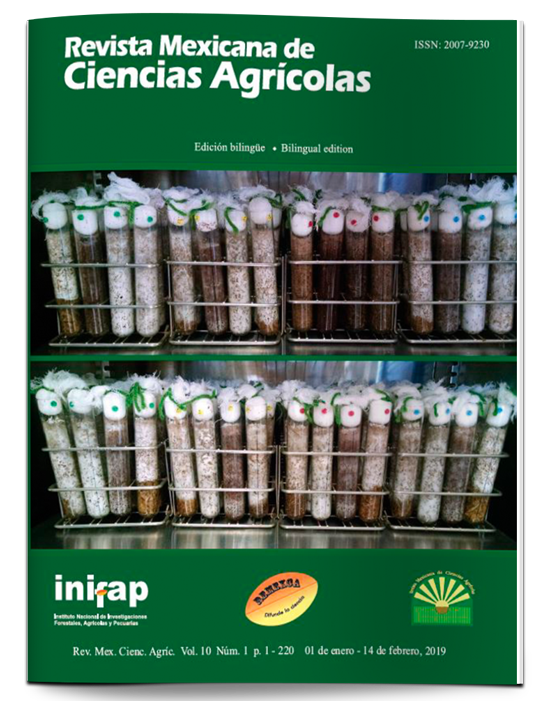Effect of weeds as coverts in soil fertility and pecanal walnut yield
DOI:
https://doi.org/10.29312/remexca.v10i1.1729Keywords:
alternation, interference, nutrients, salinity, weed.Abstract
The objective of this work was to evaluate the effect of the weed as a long-term covert in the soil fertility and performance of the pecanal walnut Carya illinoinensis (Wangenh.) K. Koch. The work was developed in the 32-year-old Western cv, under drip irrigation, in the coast of Hermosillo, Sonora. The treatments consisted of weed-based vegetation covering and the clean control, which were distributed in a design of paired plots with four replications, with an experimental unit of three trees per row. In content of organic matter, pH and most of the nutrients in the soil, it was higher in the treatment with coverts than in the control (p< 0.05) ten years after the beginning of the work, while the salinity of the soil was not modified. The average performance during the evaluation period was similar (p< 0.05) in both treatments. The greatest changes in the content of organic matter and concentration of nutrients occurred in the first 30 cm of depth. There were changes in fertility and salinity in the soil profile, but they were independent of the cover. The results show that in adult orchards of pecan tree, weeds can be used as coverts to improve the quality of the soil without affecting the performance of the pecanal walnut.
Downloads
Downloads
Published
How to Cite
Issue
Section
License
The authors who publish in Revista Mexicana de Ciencias Agrícolas accept the following conditions:
In accordance with copyright laws, Revista Mexicana de Ciencias Agrícolas recognizes and respects the authors’ moral right and ownership of property rights which will be transferred to the journal for dissemination in open access. Invariably, all the authors have to sign a letter of transfer of property rights and of originality of the article to Instituto Nacional de Investigaciones Forestales, Agrícolas y Pecuarias (INIFAP) [National Institute of Forestry, Agricultural and Livestock Research]. The author(s) must pay a fee for the reception of articles before proceeding to editorial review.
All the texts published by Revista Mexicana de Ciencias Agrícolas —with no exception— are distributed under a Creative Commons License Attribution-NonCommercial 4.0 International (CC BY-NC 4.0), which allows third parties to use the publication as long as the work’s authorship and its first publication in this journal are mentioned.
The author(s) can enter into independent and additional contractual agreements for the nonexclusive distribution of the version of the article published in Revista Mexicana de Ciencias Agrícolas (for example include it into an institutional repository or publish it in a book) as long as it is clearly and explicitly indicated that the work was published for the first time in Revista Mexicana de Ciencias Agrícolas.
For all the above, the authors shall send the Letter-transfer of Property Rights for the first publication duly filled in and signed by the author(s). This form must be sent as a PDF file to: revista_atm@yahoo.com.mx; cienciasagricola@inifap.gob.mx; remexca2017@gmail.
This work is licensed under a Creative Commons Attribution-Noncommercial 4.0 International license.



